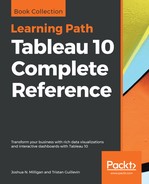We've covered quite a bit of ground in this chapter! You should now have a good grasp of when to use certain types of visualizations. The types of questions you ask of the data will often lead you to a certain type of view. You've explored how to create these various types and how to extend basic visualizations using a variety of advanced techniques such as calculated fields, jittering, multiple mark types, and dual axis. Along the way, we've also covered some details on how dates work in Tableau and using the special Measure Names / Measure Values fields.
Hopefully, the examples using calculations in this chapter have to whet your appetite for learning more about calculated fields. The ability to create calculations in Tableau opens up endless possibilities for extending the analysis of the data, calculating results, customizing visualizations, and creating rich user interactivity. We'll dive deep into row level, aggregate, level of detail, and table calculations in the next two chapters to see how they work and what amazing things they can do.
